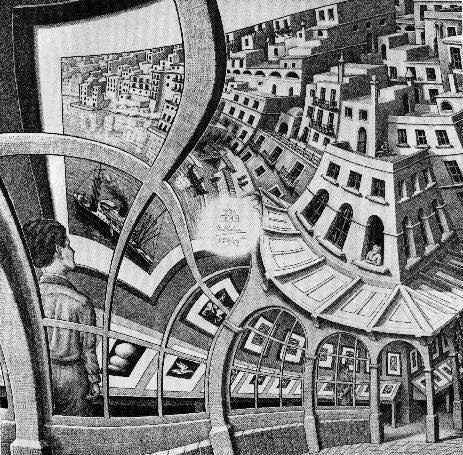The View from Afar
Writings by retired newspaper publisher Stephen Waters

The fabric of society: 4. Individuals mature using dynamic processes
fas04of14 Rome (NY) Sentinel 2015-10-05 October 5, 2015
The evidence of writing is that humans acquired consciousness over time and not in a single cataclysmic event. Some acquired it, some did not, and, unbelievably, some cultures lost the skill. While there are a lot of things that consciousness is not, psychologist Julian Jaynes holds consciousness to be a very simple thing that includes:
1. The idea of self and the possibility of self-reflection with which we can create a concept of ourselves, and
2. A sense of time for the self we create. [1]
Author Douglas Hofstadter suggests that the emergent phenomena of the brain–those are ideas, hopes, images, analogies, and finally consciousness and free will–are based on a ‘strange loop’ that we have learned to call recursion: an interaction between the top level reaching back into the bottom level and influencing the thought process for succeeding iterations. [2]
M. C. Escher’s Print Gallery [3] is a visual representation of the recursive process.

RECURSION—Escher’s Print Gallery shows a viewer in a gallery looking at a cityscape that includes a gallery with a viewer in a gallery in a never-ending feedback loop. — M. C. Escher
The subject of the print is a person seen through a gallery window looking at a print of a cityscape that has a person seen through a gallery window looking at a print of a cityscape . . . a description that cycles infinitely.
Thinking as we have been talking about it — conscious thought — is acquired. Self-reference is acquired. Narratization — the “I will do this, then I will do that” — is acquired, reinforcing the concept of time, one’s place in time, and the concept of recursion. Narratization is what Lucy Calkins teaches in her Columbia Teachers College Writing Workshop, successfully even to students in Kindergarten.
Experience, process, pattern recognition, defensive rhetorical skills, practical experience are all dynamic tools one uses to make more accurate one’s mental map of reality the better to make decisions and the better to defend against what is destructive that people, including oneself, might propose.
Metaphors from experience motivate. Useful processes and experience can be mined from what has gone before. In the 1300s, Sociologist Ibn Khaldun studying historiography, discovered in the flaws of earlier historians the need for humility. He emphasized Hegelian or Marxian dialectic — feedback loops — a process of continuous re-evaluation necessary because — and this is the keystone of wisdom — sometimes we think we are right simply because we think we are right.
Negotiating our way through life, we are interested in the simple daily problems of living such as dealing with people and dealing with the loops that we get into in our own minds. Loops that we have described happen every day in thought. It is positive insight not to blindly trust what we think simply because we are the ones who think a thought.
[The next article examines how character has been taught ineffectively across history.]
[1] Jaynes, Julian. The Origin of Consciousness in the Breakdown of the Bicameral Mind. Boston, MA: Houghton Mifflin Company, 1976. Print.
[2] Hofstadter, Douglas. Gödel, Escher and Bach: An Eternal Golden Braid. New York: Vintage Books, 1980. Print.
[3] Escher, M. C. Print Gallery.

Stephen B. Waters
In early 2021, with 46 years in the business, I retired as publisher of the Rome (NY) Daily Sentinel
After five generations of family ownership, despite an unsettled economy, we keep on. We understand that although we may own the newspaper, we hold it in stewardship for the community.
Across my career, so many other small newspapers were purchased by media chains, large newspapers sold their integrity, and broadcast news outfits fell back on superficial entertainment.
They put journalism in this country at risk. The best antidote is for individual readers to arm themselves to recognize the danger to their community, culture, and society itself.
Index
-
 sbwTweet
sbwTweet
Mostly Links and Retweets -
 Essays
Essays
Writings across time -
 Editorials and columns
Editorials and columns
For the newspaper -
 Presentations
Presentations
Community discourse -
 Books
Books
Published and available -
 Audiobooks
Audiobooks
Readings and more